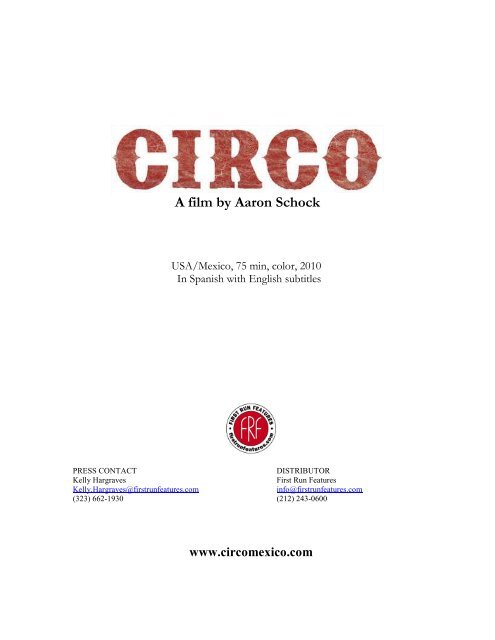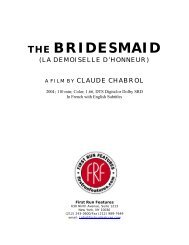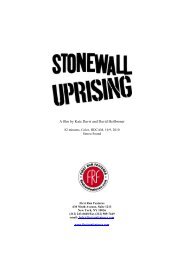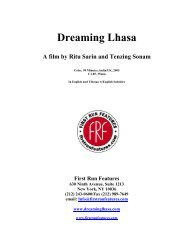CIRCO PK - First Run Features
CIRCO PK - First Run Features
CIRCO PK - First Run Features
You also want an ePaper? Increase the reach of your titles
YUMPU automatically turns print PDFs into web optimized ePapers that Google loves.
PRESS CONTACT<br />
Kelly Hargraves<br />
Kelly.Hargraves@firstrunfeatures.com<br />
(323) 662-1930<br />
A film by Aaron Schock<br />
USA/Mexico, 75 min, color, 2010<br />
In Spanish with English subtitles<br />
www.circomexico.com<br />
DISTRIBUTOR<br />
<strong>First</strong> <strong>Run</strong> <strong>Features</strong><br />
info@firstrunfeatures.com<br />
(212) 243-0600
PRAISE FOR <strong>CIRCO</strong><br />
"CRITIC’S PICK! Circo offers a touching chronicle of a dying culture harnessed to<br />
ambitions that remain very much alive." - Jeannette Catsoulis, The New York Times<br />
“4 STARS! A gem of a documentary...<br />
crisply shot, emotionally frank, and genuinely moving.”<br />
-Adam Lee Davies, Time Out London<br />
"Circo has the succinct haunting contradiction of a good Steinbeck story… Schock<br />
exhibits the feel for casual yet revealing details that suggests the potential of a major<br />
filmmaker. This film deserves to be included among the handful of docs that audiences<br />
actually support each year, as it's one of the most humane, not to mention pleasurable,<br />
docs that I've seen in years."<br />
- Chuck Bowen, Slant Magazine<br />
“A ravishing portrait.”<br />
-Michael Kurcfeld, Huffington Post<br />
“An extraordinary film...powerful and universal.”<br />
-Sharon Jimenez, Latino Weekly<br />
“Triumphant...a riveting patchwork of interconnected family dramas.”<br />
-Ernest Hardy, LA Weekly<br />
“As entertaining as any scripted narrative.”<br />
-Mark Bell, Film Threat<br />
“Visual poetry.”<br />
-Sherri Linden, Hollywood Reporter<br />
“An astonishingly affecting debut feature film.”<br />
-Sam Weisberg, Film Comment<br />
“A gripping narrative!”<br />
-Kristy Puchko, The Film Stage<br />
“A beautifully shot film!”<br />
-Jessica Weisberg, The Faster Times<br />
“[A] truly lovely portrait of a small, independent, very traditional family circus and a fast<br />
fading way of life. If the Gran Circo Mexico does eventually fall by the wayside, at least<br />
we will have this captivating and wonderfully empathetic documentary to memorialize it.”<br />
-Jennifer Merin, About.com Documentaries
SHORT SYNOPSIS<br />
The Ponce family's hardscrabble circus has lived and performed on the back roads of<br />
Mexico since the 19th century. But can their way of life survive into the 21 st century?<br />
Against the backdrop of Mexico’s collapsing rural economy, the ringmaster must choose<br />
between his family tradition and a wife who wants a better life for their family outside the<br />
circus.<br />
LONG SYNOPSIS<br />
Set within a century-old traveling circus, <strong>CIRCO</strong> is an intimate portrait of a Mexican<br />
family struggling to stay together despite mounting debt, dwindling audiences, and a<br />
simmering family conflict that threatens this once-vibrant family tradition. Tino, the<br />
ringmaster, is driven by his dream to lead his parents’ circus to success and corrals the<br />
energy of his whole family, including his four young children, towards this singular goal.<br />
But his wife Ivonne is determined to make a change. Feeling exploited by her in-laws,<br />
she longs to return to her kids a childhood lost to laboring in the circus.<br />
Filmed along the backroads of rural Mexico, this cinematic road movie opens the viewer<br />
to the luminous world of a traveling circus while examining the universal themes of<br />
family bonds, filial responsibility, and the weight of cultural inheritance. Through an<br />
intricately woven story of a marriage in trouble and of a century-old family tradition that<br />
hangs in the balance, <strong>CIRCO</strong> asks: To whom and to what should we ultimately owe our<br />
allegiances?
DIRECTOR’S STATEMENT<br />
The inspiration to make Circo was a desire to reverse the direction of the<br />
documentary lens that has typically looked at Mexico only from the border up and<br />
singularly through the subject of immigration. Instead, I wanted to go deep into the<br />
Mexican countryside and find a story that could communicate both the richness<br />
and the complexities of a vast culture and social order unfamiliar to most Americans. My<br />
original plan was to make a film about corn farmers. But one night while I was in a small<br />
village in the state of Nayarit doing field research, a traveling circus came to town.<br />
That night I went to the circus. The plan changed.<br />
The Ponce family’s “Gran Circo Mexico” packed in much more magic and<br />
excitement than you would have imagined from a 10-member family, of whom 5 were<br />
children. I was taken in by their beguiling performances of contorsionismo<br />
(contorionism), cuerdas astrales (aerial ropes), la cuerda floja (the tightrope), the young<br />
peyaso (clown) and the remarkable globo de la muerta (the globe of death). Accenting<br />
this ambience was the somewhat honky-tonk atmosphere provided by the village<br />
audience on the bleachers, and the communication between them and the performers on<br />
stage. Scanning the faces of the abuelos with their grandchildren on their knees, I<br />
couldn’t escape the feeling I was witnessing a rich, complex, and authentic rural tradition.<br />
Over the next several days, I got to know the family that brought to this poor<br />
farming town a little bit of magic and diversion. The Ponces had been living and<br />
performing on the road continuously since the late 19th Century, but what I discovered<br />
was so far removed from the stereo-type of “circus types.” Instead, I encountered a<br />
family working extremely hard to run a small business and to maintain some control over<br />
their destiny with the cultural resources passed down to them through the generations.<br />
had expected.<br />
In other words, I found the story that I had been looking for, but just not the one I<br />
Returning many months later and prepared to start filming, I was immediately<br />
struck by the amount of labor involved in running the circus, especially for the children,<br />
who not only train and perform their acts each night, but who also must strike and pitch<br />
the circus each week as the Ponces move from town to town. The costs of this life were<br />
immediately evident. When I filmed 12-year-old Moises Ponce driving in a stake early
one morning on my second day of shooting, I knew Circo would have to be about the<br />
hard choices this family had to make. When I filmed 10-year-old Alexia<br />
Ponce explaining to me that she could not read or write – and later when I filmed<br />
her father Tino Ponce struggling to spell his own name – these choices came into even<br />
sharper focus.<br />
It often happens in documentary that you discover your story sometime after you<br />
have chosen your subject. When I began filming, I didn’t know I was about to enter a<br />
simmering family dispute between a husband and wife over whether they should pass<br />
their century-old circus tradition on to their children. The heart of the conflict was an<br />
archly conflicting view of filial responsibility: Should parents serve children, or should<br />
children serve parents? What I felt I was witnessing was really a process of value change<br />
in rural Mexico, and the stains that change caused in this particular tradition and in this<br />
particular marriage. Over time, it was clear that I would interweave the story of the<br />
fading of the circus tradition and the dissolution of this marriage.<br />
Over the course of filming, events began to happen with other family members,<br />
and Circo’s subplots began to take shape. Tino’s younger brother Tacho suddenly left the<br />
circus and moved in with a settled woman, causing strain on the circus. Tino’s<br />
5-year-old niece Naydelin was struggling to make the decision to continue living<br />
and performing with the circus, or to return home to her settled mother and go to<br />
kindergarten. As I found each circus member negotiating their relationship to a tradition<br />
that permeates every aspect of their lives, it became clear that Circo would also have to<br />
be about the weight of cultural inheritance – that is, what it means to be born into a<br />
cultural tradition, and how people individually navigate that inheritance.<br />
My hope is that Circo tells both a universal story while allowing the audience to<br />
enter into a specific family, tradition, and country. I think that the Ponce family’s<br />
dilemma is a universal one experienced by millions of rural Mexicans for whom a way of<br />
life that has sustained them for centuries is increasingly unsustainable, and where other<br />
options are few.
ABOUT THE FILMMAKER<br />
AARON SCHOCK (Director / Producer / Cinematographer / Writer)<br />
Aaron Schock holds a MA in government from Columbia University and worked for<br />
several years in non-profit community development in New York City before moving<br />
into filmmaking. His first film, Song of Roosevelt Ave. (2005), an award-winning<br />
documentary short about undocumented immigrants in Queens, has played in over a<br />
dozen film festivals around the world, including Big Sky Documentary Film Festival<br />
(Missoula), Artivist (Los Angeles), Urban TV (Madrid), DOCNZ (Auckland and<br />
Wellington) and at the Queens Museum of Art (NYC). <strong>CIRCO</strong> is his first feature.<br />
ABOUT THE PONCE FAMILY<br />
The Ponce family’s 7-generation-old circus dates back to the late 19th Century.<br />
Founded by Genaro Ponce, Circo Ponce Hermanos formed during Mexico’s<br />
consolidation of the modern circus tradition in the later 1800s, when circuses like the<br />
famed Circo Atayde emerged in Mexico. While never quite reaching that size and scale,<br />
the Ponce family maintained a 30-member strong circus late into the 1980s, when family<br />
members began to break apart and form their own smaller circuses. Descending from the<br />
original circus, there are now about 25 Ponce family circuses of all sizes and shapes still<br />
traveling in Mexico, carrying on the tradition of their forbearers. The Ponces originally<br />
come from the Mexican state of Sinaloa, where its oldest living matriarch Alejandra<br />
Ponce now resides, and her husband Alejandro Ponce is buried and is visited on Day of<br />
the Dead by Ponce family relatives from all over Mexico.<br />
PRODUCTION NOTES<br />
Principal photography for <strong>CIRCO</strong> was conducted during 8 visits to Mexico over a period<br />
of 21 months. Director Aaron Schock worked alone during this time, and was responsible<br />
for producing, directing, cinematography, and sound recording. The film was shot on the<br />
Panasonic DVX100B in anamorphic, 24PA mode. All sound was recorded on camera<br />
with Sennheiser microphones, while Lectrosonic lav mics were used in interview<br />
settings.
CREDITS<br />
Director/Producer/Camera/Sound: Aaron Schock<br />
Editor: Mark Becker<br />
Producer: Jannat Gargi<br />
Writer: Aaron Schock and Mark Becker<br />
Executive Producer: Sally Jo Fifer<br />
Assistant Editor: Viviana Diaz<br />
Editorial Consultants: Richard Hankin and Paola Gutierrez-Ortiz<br />
Sound Edit & Mix: Ron Bochar, C5/NYC<br />
Color Grading: Will Cox, Final Frame/NYC<br />
Titles/Animation: Kristyn Hume, Postillion/NYC<br />
Produced by: Hecho a Mano Films and The Independent Television Service<br />
Additional funding and support provided by: New York State Council on the Arts<br />
(NYSCA), The Jerome Foundation, The Paley Center for Media, The Independent Film<br />
Project (IFP), Third World Newsreel<br />
In Spanish with English subtitles
Selected Press<br />
http://movies.nytimes.com/2011/04/01/movies/circo-looks-at-a-family-circusreview.html<br />
Circo (2010)<br />
<strong>First</strong> <strong>Run</strong> <strong>Features</strong>, Alexia Ponce, left, and Reyna Ponce in Aaron Schock's “Circo.”<br />
Big Top as Family Business<br />
By JEANNETTE CATSOULIS<br />
Published: March 31, 2011<br />
Paralleling the death throes of a marriage and a 100-year-old tradition, “Circo”<br />
takes to the earthen roads of rural Mexico to document one of the Ponce family’s<br />
many traveling circuses.<br />
Known as the Gran Circo Mexico, this struggling caravan of lions, llamas, clowns<br />
and contortionists is constantly on the move. Stopping for only one or two days at
a time, the 10-person outfit (5 adults and 5 children) toils in an endless cycle of<br />
loading and offloading, erecting and disassembling. For Tino Ponce, the<br />
ringmaster and jack of all trades, there is no other possible life, and his fierce love<br />
for the business is ample consolation for his lack of literacy.<br />
But his wife, Ivonne — who married into the circus — feels differently. “They give<br />
us too much,” she says, watching her young children juggle, contort and swing<br />
from silk streamers. The daily grind of chores, rehearsals and performances<br />
leaves little time for school, and Ivonne resents their unrelentingly laborious life<br />
and her father-in-law’s monopoly on their earnings. And though her children<br />
seem mostly content — while marveling that their peers in the towns they pass<br />
through do nothing but “go to school and play”— it soon becomes clear that the<br />
animals are not the only ones who are caged.<br />
The first feature from Aaron Schock (who also shot the film’s soft, smudged<br />
images), “Circo” offers a touching chronicle of a dying culture harnessed to<br />
ambitions that remain very much alive. Never mind the declining attendance,<br />
collapsing economy, backbreaking debt and intra-familial tensions; to Tino his<br />
circus is still the greatest show on earth.<br />
<strong>CIRCO</strong><br />
Opens on Friday in Manhattan.<br />
Produced and directed by Aaron Schock; written by Mr. Schock and Mark Becker;<br />
director of photography, Mr. Schock; edited by Mr. Becker; music by Calexico;<br />
produced by Jannat Gargi, Hecho a Mano Films and the Independent Television<br />
Service; released by <strong>First</strong> <strong>Run</strong> <strong>Features</strong>. At the IFC Center, 323 Avenue of the<br />
Americas, at Third Street, Greenwich Village. In Spanish, with English subtitles.<br />
<strong>Run</strong>ning time: 1 hour 15 minutes. This film is not rated.<br />
A version of this review appeared in print on April 1, 2011, on page C10 of the New<br />
York edition.
http://www.hollywoodreporter.com/review/circo-film-review-29731<br />
Circo -- Film Review<br />
11:43 PM 10/14/2010 by Sheri Linden, AP<br />
The financial struggles of a family business, the balancing act between work and<br />
parenthood -- the documentary "Circo" revolves around universal themes that have been<br />
explored countless times. But the business it profiles is a particular world: an itinerant<br />
troupe of contortionists, clowns and animal trainers crisscrossing the back roads of<br />
Mexico. Aaron Schock's first feature, receiving its world premiere at the Los Angeles<br />
Film Festival, is a well-told tale, and though its compact running time makes it a fine TV<br />
fit, its visual poetry is worth a big-screen look. It's noteworthy, too, as a film that's<br />
immersed in Mexican culture without reference to the country's neighbor to the north.<br />
The Gran Circo Mexico is part of a hundred-year tradition in the Ponce family. As<br />
Schock follows the caravan, he finds that tradition smack up against the economic<br />
downturn and marital tensions. "Through the good and the bad, always the circus" is a<br />
mantra among the five adults and five kids who make up the enterprise; the words ring<br />
not only with pride but with the existential resignation one would expect from a Chekhov<br />
character.<br />
Ringmaster Tino's children have inherited the performing gene, but his wife, Ivonne -- a<br />
town girl who fell for the circus boy -- weeps for the childhood they've given up. Abiding<br />
what she considers the ways of the past increasingly is difficult for her. She views Tino's<br />
father, who owns the circus, as the only one who benefits from the family's hard work.<br />
Schock apparently agrees: The few times the patriarch appears onscreen, he's counting<br />
money or badmouthing his other son's girlfriend.<br />
For the Ponces, the world is divided into the circus and the towns. Like an artist baffled<br />
by the narrow horizons of the bourgeoisie, Tino's 5-year-old niece feels sorry for kids<br />
who do nothing except go to school and play. Her older cousin, deftly applying glitter to<br />
her eyelids, knows how to write only a handful of words. The image of tiger cubs in their<br />
cage delivers metaphorical punch -- one of the more obvious moments in this astute film.
http://www.villagevoice.com/2011-03-30/film/respecting-the-big-top-grind-in-circo/<br />
Respecting the Big-Top Grind in Circo<br />
By Ernest Hardy Wednesday, Mar 30 2011<br />
“The circus is tough and beautiful,” says a talking head in Aaron Schock’s<br />
documentary on the small, struggling, family-owned Circo Mexico. It’s an apt<br />
description of the film itself, a riveting patchwork of interconnected dramas that<br />
include difficult in-laws, arguments about money and familial exploitation, and<br />
the wrenching tensions between honoring tradition and forging one’s own path.<br />
Tino Ponce, his unhappy wife, and their four kids are the primary focus of<br />
Schock’s camera—he also does lovely work as the cinematographer—as he follows<br />
them and their extended clan (the Ponces have been in the Mexican circus biz for<br />
more than 100 years) in their battle against changing cultural tastes and the<br />
assorted tolls of their hard-knock life. Circo is filled with beautiful images and<br />
haunting moments, especially in the third act, when the family unravels as the<br />
film culminates in a final triumphant, haunting image. Perhaps the most moving<br />
element of the film is the way Schock captures the backbreaking work of<br />
sustaining the circus. He neither condescends nor fetishizes; instead, he respects<br />
the grind and is able to show—without judgment—how it sustains Tino even as it<br />
consumes those he loves.<br />
http://www.sandiegoreader.com/news/2011/may/04/movie-review-depths-hollows/
Depths, Hollows: Circo, Cave of Forgotten Dreams, Meek's Cutoff,<br />
and Poetry.<br />
By David Elliott | Published Wednesday, May 4, 2011<br />
Sometimes a little movie is a big movie. Sometimes a little movie offers riches, and I am<br />
happy to spill the news one week early for:<br />
Circo<br />
FOUR STARS - The Ken Cinema, a one-screen theater, will rightly house Circo, surely<br />
the best movie ever made about a one-ring circus. Aaron Schock directed, also expertly<br />
manning the camera. He follows the route of Gran Circo México, a family operation in<br />
the rural depths of the country.<br />
Tino Ponce runs it, while his aged father counts the take. Profits are shrinking, but<br />
villagers still bring eager kids for a good time that isn’t TV (though one act takes off on<br />
TV wrestling heroes). There is a foreboding sense that this could be The Last Circus<br />
Show, as Tino sweats the truck travels, the tent work, the promotion, the repairs, the<br />
training, the animal upkeep. His small team includes his parents, wife, and kids.<br />
There is an aerialist son and a gamine daughter who does acrobatics and an adorable<br />
niece who painfully learns body contortion. The kids relish a fascinating life despite hard<br />
times and endless work, though the nearby presence of an old lion and two growing<br />
tigers is worrisome. What most worries Tino’s wife Ivonne, who fell hard for Tino and<br />
married into the Ponce tradition, is that the children receive no formal education.<br />
Literacy lies low among circus values, and Tino loves the life despite marital and<br />
business stresses. His clan runs four struggling circuses. If only Gran Circo México<br />
could stay in one place like a Diego Rivera mural, pero no es posible. An itinerant<br />
destiny carries them along, to strums of soundtrack support from the band Calexico.<br />
Schock has made one of the most enjoyably Mexican of movies, a vividly populated<br />
poem of the open road akin to Fellini’s Variety Lights and La Strada. Sadness, humor,<br />
skill, and joy mix together authentically, like the elements in Diana Kennedy’s books on<br />
Mexican cooking. When the family granny says, “The load makes the donkeys walk,” we<br />
feel the power of truths that must go back at least to Don Quixote. In the art of<br />
documentary, Circo is a three-ring event, and it opens on May 13.







